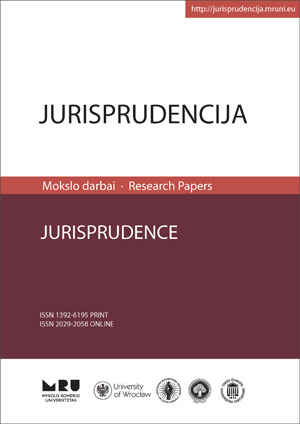SAVAIMINIO DARBO SANTYKIŲ TĘSTINUMO PRINCIPAS
ĮMONĖS, VERSLO AR JŲ DALIŲ PERDAVIMO ATVEJU
PRINCIPLE OF CONTINUATION OF THE EMPLOYMENT IN THE EVENT OF A TRANSFER OF THE UNDERTAKING OR BUSINESS OR PARTS THEREOF
Author(s): Vilius MačiulaitisSubject(s): Law, Constitution, Jurisprudence
Published by: Mykolas Romeris University
Keywords: transfer of undertaking; principle of continuation of employment; termination of employment; employers duty to take over employees
Summary/Abstract: It is evident that the social and economical progress has a great influence on development of law. Conventional constructs of law are no longer suitable for newly arising forms of social and economical relations. However, law must be adapted to the new-formed social-economical environment. In order to be competitive, undertakings are forced to look for new possibilities to increase their business efficiency. It is being implemented in various ways: focusing on particular niche businesses, abandoning various optional functions which are not directly related to particular business and implementing the transfer of undertakings, businesses or parts of undertakings or businesses. The latter processes are not necessarily related to the increase of business efficiency but they may become the subject of conventional civil agreements (trade, lease of other transfer of business or its parts). In such cases not only a transferor and transferee of an undertaking, business or parts of undertaking or business participate in the process; employees of such undertaking are also involved therein. However, for the most part employees are passive participants having no possibility to make direct influence on transfer agreement itself. In such cases the social function of labour law requires to determine a certain protection of employees in order not to violate their interests and legitimate expectations. Principle of stability of labour relations is exactly one of those which ensure such right of employees. The same applies to the derivative principle of continuity of labour relations.Principles of protection of employees’ rights are determined in the Council Directive 2001/23/EC of 12 March 2001 on the approximation of the laws of the Member States relating to the safeguarding of employees’ rights in the event of transfers of undertakings, businesses or parts of undertakings or businesses, the provisions of which are also transferred into Article 138 of the Labour Code of the Republic of Lithuania.The issues of employees’ protection are of great relevance in the context of common aim to liberalize labour relations. Moreover, various processes of business reorganisation, transfers of undertakings, businesses or parts of undertakings or businesses have significant impact not only on business processes intended for reduction of costs and business optimization but also on protection of job guarantees of employees and job retention. A considerable amount of jurisprudence of the European Court of Justice on employees’ protection in the event of transfers of undertakings, businesses or parts of undertakings or businesses proves the relevance of this issue. The Court emphasizes the importance of national courts when dealing with particular cases of violations of safeguarding of employees’ rights. In these latter years the Supreme Court of Lithuania was forming the national case law on this issue notifying the principle of continuity of labour relations which means the duty of transferee of undertaking, business or parts of undertaking or business also to take over the obligations of transferor in respect ofemployees. The problems of chosen subject will be analysed on the grounds of the case law of the European Court of Justice and the Supreme Court of Lithuania.
Journal: Jurisprudencija
- Issue Year: 22/2015
- Issue No: 1
- Page Range: 30-47
- Page Count: 18
- Language: Lithuanian

